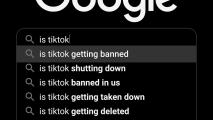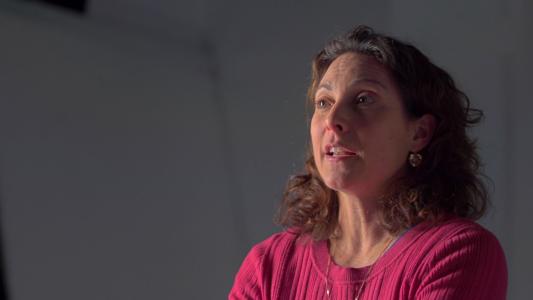Miriam Krinsky is Executive Director of the group Fair and Just Prosecution, which is helping transform the criminal justice system by highlighting the roles and responsibilities of prosecutors. FJP’s mission is to help prosecutors “move beyond incarceration-driven approaches and develop policies that promote a smarter and more equitable justice system.”
They are bringing together a new generation of prosecutors with a shared vision of fair, compassionate, and responsible criminal justice reform, and they provide resources, networking, and expertise for attorneys looking to make a difference in their local communities.
Freethink talked with Krinsky about her background as a prosecutor during the rise of mass incarceration, what she learned, and what is happening now that is changing the landscape of American criminal justice.
This interview has been edited and condensed for clarity.
Freethink: Can you tell us a bit about what it was like working as a prosecutor during the era of “broken windows,” “zero tolerance,” and “tough on crime” law enforcement, and how today things might be changing?
Miriam Krinsky (MK): What I saw was a period of time where there obviously had been some challenges and problems within law enforcement. I prosecuted in the ‘80s and ‘90s, which was sort of the heyday of “tough on crime” and ramping up of mandatory minimums and sentencing guidelines—sort of the fear-driven approach to the justice system.
But now there’s been more of a bright spotlight that’s been put on the role that law enforcement plays and how they’ve contributed to concerns around the escalating numbers of individuals in the justice system—in many situations, contributing to over-policing of some communities and an uptick in the population we’ve incarcerated over time.
I think what we’ve seen very recently is a growing awakening around the role of prosecutors in all of that and the impact that prosecutors have. The vast majority of cases aren’t disposed of in the way we think of in Law & Order—over 95% of cases don’t go to trial. It’s not a jury that decides on somebody’s fate, but it’s the plea bargain that drives the result.
And those really happen kind of in back rooms and without a bright spotlight put on them, and it’s prosecutors that drive those results as well.
I think, for good reason, there is an awakening around the need for prosecutors to be put under the spotlight, to be held accountable. And, given the fact that they’re elected, the importance of voters knowing and understanding their role, going to the voting booth to use that vote to really be able to express the choices that the community wants to make and the lens that they want to bring to the justice system.
Freethink: Did you have this approach back when you were a prosecutor, or what did you see that changed your perspective?
MK: I think I really didn’t have that breadth of perspective, or even this kind of high-altitude view, during much of my early years as a prosecutor. I started in the late ‘80s, and I spent most of my fifteen years in Los Angeles, an area that was going through an upsurge in prosecutions around crack cocaine, as those penalties came into play. I saw the sentencing guidelines come about, I saw mandatory minimums being piled on right and left.
Toward the middle of my career, I started supervising. Ultimately, during the last 5 years of my tenure, I was in charge of our criminal appellate division—at that point, I was seeing two hundred caseloads.
Through that lens, I was just seeing too many patterns that started disturbing me. Too many young people, largely young people of color, coming into the system. I started to see, over the course of time, kids of people I had prosecuted coming in—that horrible inter-generational cycle that we were creating.
With the mandated crack penalties, the young people started coming in—who by and large had come from broken families or underserved parts of our community, many of them had been through the child welfare system—and it just seemed like this revolving door was spinning too fast.
We would do large-scale prosecutions, we would move many young people from a neighborhood or off a street corner—and within a week, another group of individuals would be back on that same street corner. Within a few years, people we had put in the system would be right back there themselves, at a higher risk of recidivism and a higher likelihood of coming back as a danger to the community, with our having disrupted their families and their communities.
It was a perspective that I started to find deeply troubling over time.
Freethink: That’s a difficult situation to find yourself. What did you do next, and what brought you back to this issue of prosecution?
MK: When I left, it was to do something that few prosecutors have left the office in Los Angeles to do. I left to run a legal services organization that represented children and young people in the child welfare juvenile justice system.
I felt that we really needed to be seizing windows of opportunity before they closed. And that if we could make a difference in the lives of young people who were at risk, we could be doing far more to promote better outcomes and safer communities and better results for the individuals themselves. Using the time and energy I had to try to find a way to bring about reform in those areas was, in my mind, a far better investment of effort—a far better way to be dealing with the sorts of things that I entered prosecution to do. I spent the next decade and a half working on juvenile justice and issues involving children, and then 5 years working on law enforcement reform.
I never thought I’d return to prosecution. I really left a little bit heart-stricken at what the field was doing. But a couple of years ago I started to see this increasing attention on the field—an awakening to the impact of prosecutors and the beginning of what has now become a growing cohort of individuals being elected as prosecutors, running on an agenda of really bring about change. Recognizing the clout they have, the power to do things differently, and committing to downsizing the justice system, trying to be smarter about the use of their discretion, and trying to close down a little bit of the pipeline and think about the underlying root cause that cause people to come into contact with the criminal justice system.
It was starting to see that beginning of a new wave of thinkers that convinced me that it was time to come back to the field. There is this incredible moment of opportunity right now—helping these individuals do more, think more, understand what’s going on around the country, connect them to each other, connect them to experts—is a wonderful opportunity to impact the field. That’s what brought me back. That’s what Fair and Just Prosecution has been trying to do.
Freethink: One big question that arises is “why now?” What has changed in the last few years, when we’ve had these problems for decades, to make people question what we want the criminal justice system to do?
MK: I’ve thought about this question a lot. I don’t profess to have the complete answer. My own thoughts and guesses are a confluence of a couple of things.
I think the first answer to “why now?” is that we know more. There’s a greater understanding and sophistication about the role of prosecutors and what the result has been. There has been a growing understanding and awareness by voters because we know so much more, and we’ve seen the result of a “tough on crime” mindset and approach. There’s been more focus on research about how the US went one direction when Europe and other parts of the world went another direction. They ended up without crime rampant on the streets, and actually in better places than we have.
I used to teach public policy about how you change systems. I think some of it is proximity to the problem: when you think about things like gay marriage, a pendulum started to swing when it was hard to find individuals who didn’t have a friend, a family member or a loved one who was impacted by policy choices that people eventually concluded weren’t the right choices.
I think it’s similar with the criminal justice system. It has become so large and impacted so many, that it is now harder to find individuals who, when you ask the question, “How many of you have yourselves or have had a friend or a loved one, or someone you care about, come into contact with the justice system?” I used to ask those questions and not that many hands went up. Now you ask the question and a lot more hands go up.
Then when you ask, “How do you think they were treated?” Or, “Do you feel like the result was an effective or good one?” Most people don’t have a positive view of how the system treated that friend or family or loved one or themselves. I think as the system started to spread, the proximity to the system was touching more people. There was more of the personal connection to kind of the insanity of what we’ve been doing.
Freethink: A lot of the people impacted by the system are also the victims of crime, who the tougher approaches were meant to help. Do you see how people approach criminal justice issues shifting with respect to victims?
MK: I think this has become a bipartisan issue. It’s not about left or right. There is an understanding on both sides of the aisle that this element of government has grown too big, and that we’ve spent too much and were not getting a return on that investment.
Whether the driver that brings people to the conversation and gets them motivated to want to see change is compassion, or fiscal concerns, or concern around the way that big government has reached too many and regulated too much, or whether it’s a view that social services support should be ramped up—whatever that driver might be, because those drivers may motivate different parts of the electorate, they are motivating people.
I think there’s also been an increased sophistication, as well, around lifting up of the voices of the victims of crime. It used to be, in the past, that a “tough on crime” mentality came from seizing upon the voice of victims of crimes, saying we want to essentially throw the books at people.
I think there’s now been an increased voice from disadvantaged communities that are often the victims of crime, saying, “That’s not what we want. We are the victims of crime, we are those impacted by violence and unsafe neighborhoods, and what we want is a smarter criminal justice system, that helps think about violence prevention, that realizes what we’ve done in the past by over incarcerating hasn’t worked. It hasn’t made us safer. It hasn’t given us the satisfaction that we’ve been treated in a way that a sensible system should treat us.”
I think the shift is kind of a confluence of all of these. Which, if I’m right, means that hopefully, this moment isn’t a fleeting one, that those factors aren’t going to change on a dime. But I don’t know that I’m right about any of that.
Freethink: Is there a trade-off between being fair to victims and deterring crime, and reducing the footprint of the justice system and being fair to criminal defendants? And if there isn’t, how do we avoid that false dichotomy? How do we talk about it?
MK: We do often assume that there’s a trade-off. I don’t dispute the fact that there is a perception that there’s a trade-off, but I don’t believe myself that that trade-off is a legitimate conclusion. I also think that there are growing voices of victims that are trying to make that clear.
What I saw during my years in law enforcement—because I worked on reform inside a large law enforcement department going through some very challenging times—is that the essence of being effective in public safety is ensuring that your community trusts you. If they don’t trust you, they don’t have faith in the integrity of what you’re doing, and I think that affects policing. I know we’ve seen that in communities where police departments have gone very bad—and often those are communities with high crime as well—communities where people are just simply not reporting crime and not trusting law enforcement to get it right. And then things really fall apart.
I think the same is true throughout the criminal justice system. If victims don’t trust the system, if they don’t think that the system has treated them and others fairly, if the system has huge racial disproportionalities, if there is over-policing certain neighborhoods, and conduct by young black men in poor communities gets treated in one way, while in affluent communities it’s not criminalized at all—then things fall apart.
We know from a lot of studies around faith in the justice system that what litigants, what victims, what people coming into contact with the system want more than anything want is to feel like they were listened to and treated fairly. We see from these studies that the result matters less than that feeling of procedural fairness.
If we’re doing things in ways that individuals, including victims—who are often from those over-policed communities—see as sensible, I think that we do promote a safer and healthier community, and victims will respond to that. Victims, when surveyed, are very willing to accept prevention, diversion, and other things that politicians often presume that they won’t be okay with.
So that’s a kind of previously disempowered victim voice that is now getting much more of a focus than it has in the past. I think there is still this view that we need to be “tough on crime” for victims to feel okay. But I don’t believe that that’s the only perspective out there and I think a different perspective has become much more amplified than it was in the past.
I don’t think it should be an either/or—I do believe that it should be all of the above. In some ways, all the above also includes community voices and victim voices and the voices of those who would like to experience a new system. It needs to be all of that.





